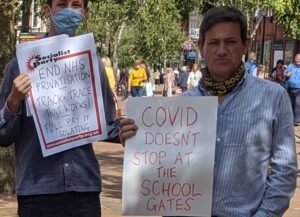At a time of a growing school funding crisis the recent victory at Southampton’s Valentine Primary, which won a two-year freeze on budget cuts through an injection of £1.6 million by Southampton council, is an important example of what can be achieved.
This is the proverbial perfect storm. Despite Tory education ministers endlessly denying the crisis, even prime minister Boris Johnson has been forced to recognise the seriousness of the situation by pledging to increase school funding by £4.6 billion by 2022. This, though, is still a long way short of the £12.6 billion needed to reverse the damage Tory governments have inflicted on pupils and school staff – and the plan to ‘level up’ funding per pupil will disproportionately increase resources for the least disadvantaged schools.
Schools have managed the cuts by an intensifying ‘efficiency regimes’, starting with paper clips and finishing with redundancies and not replacing staff, leading to higher class sizes. The remaining teachers and school staff, under the high-stakes testing regime and after a decade of pay cuts and increasing workload, are at breaking point.
In working-class communities, where the brutal impact of austerity is felt hardest, rising poverty and family breakdown, combined with cuts to youth and social services, have left schools as the only community support. They provide holiday meals for families, while teachers buy breakfasts for hungry pupils.
Squeezed of resources to meet the needs of children, in particular those with special education needs, exclusions are increasingly resorted to as the solution, with no safety net, leaving many children and their families with no support. No wonder that thousands of head teachers marched in London and are planning to do so again, in even greater numbers, on 27 September. All this points to an urgent need for national action from the teaching unions, linking up the issues of funding cuts, pay, testing, workload and austerity, which would get enormous parental support.
Of course, the trade unions have new hurdles to overcome due to the restrictive Tory anti-trade union legislation thresholds on ballots. These can be overcome, however, if the unions conduct active campaigns school by school, with a clear no-cuts message, recruiting members and reps, and mobilising support through local rallies and demonstrations to secure successful ballots. There is a critical role for National Education Union (NEU) activists to push this forward at local level to apply pressure on the national leadership to act decisively.
At the Valentine primary school, NEU activists were aware of the growing funding crisis and its impact, and saw the need to link up with other campaigners across the country. A broad campaign was launched in 2017, under the banner of Southampton Fair Funding for All Schools. It built wide support across schools in the city with local Socialist Party members playing a leading role. We explained that the solution was to restore government funding to schools while gaining financial support from the local council to prevent cuts in the meantime.
Despite the difficulties facing councils they do have powers to act. Statutory guidance for local authorities, Schemes For Financing Schools, produced by the Department for Education in December 2015, states: “An authority may include in its scheme provision for an arrangement whereby schools are allowed to plan for a deficit budget. The maximum length allowed should not exceed three years”.
This provides Labour councils with the means to make a difference and put themselves at the forefront of a fight to stop school cuts and build the pressure for an early general election. By using their borrowing powers and reserves, councils can provide temporary respite to schools, while backing campaigns to restore government funding. We made this very clear in our campaign material and as part of our strategy to win.
Demos, petitions, meetings, banner drops and leafleting schools all helped raise awareness and build confidence. But, despite all the pressure on the Labour-led city council, Southampton’s Blairite Labour councillors sat firmly on their hands saying there was nothing they could do.
Events came to a head when the governing body faced demands from the council to cut the school’s budget deficit, making staff redundant. At this stage, the role of the NEU and its members was critical. A decisive public meeting of over 100 parents, staff and union members was held to decide what to do. A tipping point had been reached. The NEU rep summed it up: “Everyone in this school is working to the max, to cut any jobs will make it impossible for us to continue”.
NEU officers backed this position, stating that the union would back strike action to prevent job cuts if necessary. Faced with this mood, the Labour councillors present had to give their verbal support. Tory councillors sat glum-faced in silence.
With council elections looming, Labour councillors were all too aware of the schools crisis impacting on voting intentions, and the support from teachers and parents to the Socialist Party’s call to stand no-cuts candidates to promote the campaign and put pressure on the council. The issue was pushed to the top of the local election agenda.
A demonstration outside the council was led by pupils holding chocolate bars, representing the equivalent cost in a family’s weekly shopping to the council for backing Southampton schools in deficit. With useable reserves of over £100 million, the council clearly had the financial means.
Despite attempts to reach a negotiated settlement, the council blocked all proposals from the NEU and so a ballot for strike action was called. It was won with overwhelming support. Every NEU member who voted to strike stood together on the picket line, alongside parents, children and campaign supporters in a powerful show of strength and solidarity. Subsequent negotiations resulted in an agreement to authorise a licensed deficit, ‘with no budget cuts for two years’, to ensure job losses were avoided. This was met with relief and jubilation by NEU members, parents and campaigners.
The fight is not over, however. New pressures are emerging, with an unfunded pay award to teachers and staff heaping pressure on school budgets. Battles are certain to continue. At a recent campaign meeting, five school heads told a Labour councillor that, while the Tories were ultimately responsible, pressure to make the cuts was coming from Southampton Labour council, that it needed to stop, and financial support be provided instead.
The schools crisis is combining with the long-running assault on funding that is pushing councils to the brink. Producing a report for the Local Government Association AGM, Lord Porter, a Tory peer and the outgoing chair of the LGA, said: “As this survey shows, if the government fails to adequately fund local government, there is a real risk to the future financial viability of some services and councils”. The report states that one in five councils is making cuts to stave off technical bankruptcy.
With councils beginning to prepare 2020-21 budgets in October the crisis in education and local council funding will be a key battleground for the looming general election as Johnson’s Brexit deadline closes in. This presents a big opportunity for the education and local authority unions to build a national campaign calling on Labour councils to use their powers to set balanced no-cuts budgets to defend schools, jobs and public services. If backed by Jeremy Corbyn with a clear commitment to restore funding to any council using reserves or borrowing to stop cuts, this could be a major factor in galvanising mass support to topple Johnson.
Valentine primary school saw its NEU membership double in the course of the campaign, with new young activists taking on roles and training to be reps. They are brimming with confidence at winning their struggle, clear that any further attempts to make cuts will be met with more strike action. However small one local victory in Southampton is, it shows the potential for a national campaign to stop school cuts, and how that could be linked to ending Tory austerity.
Nick Chaffey




